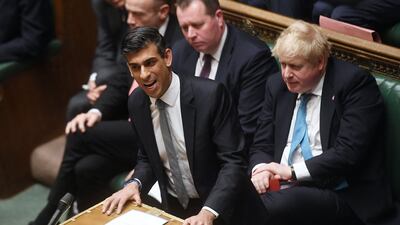To talk nonsense in my grandmother’s house would be to receive the sharp edge of her tongue. “What’s that got to do with the price of eggs?” she would ask – an old-fashioned saying meaning get real; talk about things like ordinary people.
The price of eggs is what a farmer friend has been talking about. I buy a dozen each week, and he announced that the price is rising almost 25 per cent because in the past four years organic poultry feed has increased 60 per cent, from £502.50 a tonne to £802.50 a tonne. Since the Ukraine conflict it has risen £125.
The worldwide cost of living crisis, driven by spiralling energy prices, means staple foods such as flour, bread, pasta, eggs, etc, are more expensive and governments need to do something. But the way in which the British government’s finance minister, Chancellor of the Exchequer Rishi Sunak, has reacted suggests that maybe he and his advisers don’t really know the price of eggs, or anything else, affecting most of us. The gaffes Mr Sunak has made are a salutary lesson for leaders around the world, especially since for months he has been the darling of the British media, nicknamed “Dishy Rishi” in the tabloids and tipped as a future prime minister. Yet now he is discovering that, like the stock market, political careers can sink as well as rise.
Last week Mr Sunak made what was billed as a major statement on the British economy. He announced a 5 pence a litre cut to fuel tax, plus a promised future cut in income tax. Giving away other people’s tax money always makes finance ministers popular. But then, rather than letting his policies speak for themselves, Mr Sunak staged an unwise photo-opportunity.
Trying to look like the rest of us, he put fuel in a modest family car, a Kia, exactly the kind of man-of-the-people stunt politicians love. The idea, in the spin-doctor’s cliche, is to look like all of us “hard working British people.” But the problem – a very big problem – is that the modest car wasn’t Mr Sunak’s. It was borrowed from a supermarket worker. Mr Sunak is usually seen in Jaguars or Range Rovers, costing three or four times as much as a Kia. The stunt immediately became symbolic of political leaders manipulating public opinion by appearing “just like us,” when they are nothing like us.
Then newspapers reported that Mr Sunak’s wife Akshata Murthy has received £12 million in dividends in the past year from an IT firm called Infosys, which has a market value of $100 billion. The firm, co-founded by her father, Narayana Murthy, is keeping its office open in Moscow, while Mr Sunak tells other companies to get out of Russia as part of British sanctions. The Murthy family is reported to have a £727 million stake in Infosys, and Narayana Murthy is worth £3.4 billion. Some newspapers claim Akshata Murthy is wealthier than the Queen, and photographs emerged of Narayana Murthy shaking hands with the Russian President Vladimir Putin back in 2004.


Yet it’s difficult to see what Ms Murthy or her father have done wrong. Plenty of people shook hands with Mr Putin in 2004. It’s no crime in being a hugely successful entrepreneur, nor being a billionaire’s daughter. The problem is for Mr Sunak. Does he know the price of eggs?
Politicians can survive bad publicity, but being seen to be out of touch, or being part of a billionaire family while pretending to be “one of us,” seems phoney. That is toxic. Mr Sunak’s popularity was not based on his economic genius. At the start of the coronavirus pandemic, he gave away billions in taxpayers’ money. But even with Mr Sunak’s cut in the tax on fuel last week, the price of my fill up today has still gone up again. Pump prices are the highest any of us have ever seen. And that’s why Mr Sunak’s story is not about one politician making mistakes, nor is it about Britain alone.
This is a story about politicians in democracies trying to compete for attention in the age of TikTok and Instagram. The British Foreign Secretary Liz Truss staged a photo-opportunity in a tank. Prime Minister Boris Johnson dresses up in hard hats, high-visibility vests and even a police outfit. Mr Sunak fills up someone else’s car.
Governing is never easy. But does anyone – other than public relations advisers and media consultants – really think voters are fooled that government ministers in their chauffeur-driven Range Rovers and privately chartered aircraft really do understand what it is like to have to choose between filling the car, heating the home and a big shop at the supermarket?
Few people will begrudge Mr Sunak the wealth in his family, or his fancy Jaguar or Range Rovers, or Liz Truss the private jet used for official government business, or Boris Johnson the privileges of an Old Etonian. But what really rankles is being taken for fools. The lack of empathy from those in power suggests that they may not know the price of eggs at all. It’s a pity my grandmother is not still around to give them advice. They would find the experience memorable.


